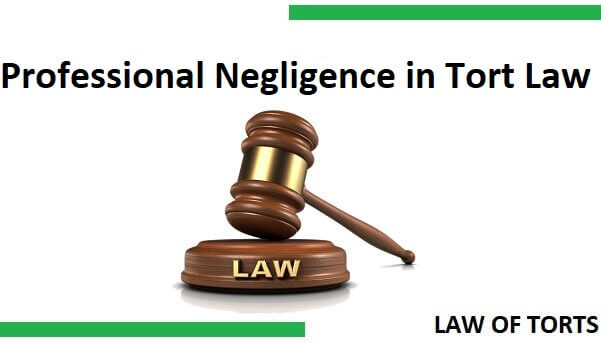In the law of professional negligence, are such as lawyers, doctors, architects. In the category are persons professing some special skill. Any task which is required to be performed with a special skill would generally be admitted or undertaken to be performed only if the person possesses the requisite skill for performing that task. The Apex Court in Jacob Mathew V. State of Punjab, explained
Any reasonable man entering into a professional negligence which requires a particular level of learning to be called a professional of that branch, impliedly assures the person dealing with him that the skill which he professes to possess shall be exercised and exercised with reasonable degree of care and caution. He does not assure his client of the result.
A lawyer does not tell his client that the client shall win the case in all circumstances. A physician would not assure the patient of full recovery in every case. A surgeon cannot and does not guarantee that the result of surgery would invariably be beneficial, much less to the extent of 100% for the person operated on.
The only assurance with such a professional can give or can be understood to have given by implication is that he is possessed of the requisite skill in that branch of profession which he is practising and while undertaking the performance of the task entrusted to him he would be exercising his skill with reasonable competence. This is all what the person approaching the professional can expect. Judged by this standard, a professional may be held liable for negligence on one of two findings : either he was not possessed of the requisite skill which he professed to have possessed, or, he did not exercise, with reasonable competence in the given case, the skill which he did possess.
The standard to be applied for judging, whether the person charged has been negligent or not, would be that of an ordinary competent person exercising ordinary skill in that profession. It is not necessary for every professional to possess the highest level of expertise in that branch which he practices.
The Hon ‘ble Court referred to the decision of Bolam v. Friern Hospital Management Committee,’ wherein McNair, J. observed: “Where you get a situation which involves the use of some special skill or competence, then the test as to whether there has been negligence or not is not the test of the man on the top of a Clapham omnibus, because he has not got this special skill. The test is the standard of the ordinary skilled man exercising and professing to have that special skill…….A man need not possess the highest expert skill; it is well established law that it is sufficient if he exercises the ordinary skill of an ordinary competent man exercising that particular art.” After a review of various authorities, Bingham L.J. in Eckersley v. Binnie,- summarized the Bolam test in the following words :
“From these general statements it follows that a professional man should command the corpus of knowledge which forms part of the professional equipment of the ordinary member of his profession. He should not lag behind other ordinary assiduous and intelligent members of his profession in knowledge of new advances, discoveries and developments in his field. He should have such an awareness as an ordinarily competent practitioner would have of the deficiencies in his knowledge and the limitations on his skill. He should be alert to the hazards and risks in any professional task he undertakes to the extent that other ordinarily competent members of the profession would be alert.
He must bring to any professional task he undertakes no less expertise, skill and care than other ordinarily competent members of his profession would bring, but need bring no more. The standard is that of the reasonable average. The law does not require of a professional man that he be a paragon combining the qualities of polymath and prophet.”
The degree of skill and care required by a medical practitioner as explained in Halsbury’s Laws of England is : “The practitioner must bring to his task a reasonable degree of skill and knowledge, and must exercise a reasonable degree of care. Neither the very highest nor a very low degree of care and competence, judged in the light of the particular circumstances of each case, is what the law requires, and a person is not liable in professional negligence because someone else of greater skill and knowledge would have prescribed different
treatment or operated in a different way; nor is he guilty of negligence if he has acted in accordance with a practice accepted as proper by a responsible body of medical men skilled in that particular art, even though a body of adverse opinion also existed among medical men.
Deviation from normal practice is held not necessarily evidence of negligence. To establish liability on that basis it must be shown “(1) that there is a usual and normal practice; (2) that the defendant has not adopted it; and (3) that the course in fact adopted is one no professional man of ordinary skill would have taken had he been acting with ordinary care.






